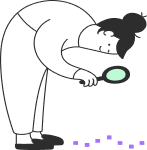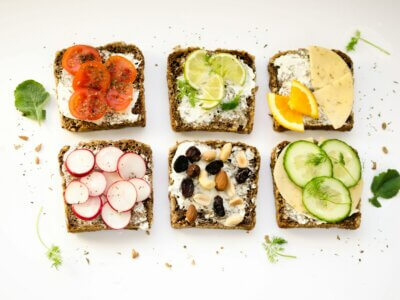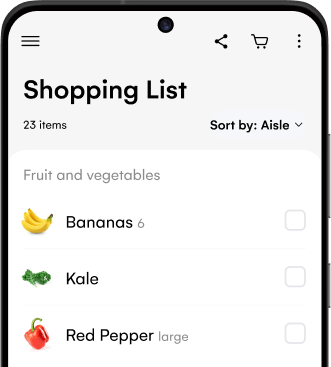When you think of foods to help build muscle, it’s safe to say protein gets all of the attention. Carbs and fat are mainly used for endurance exercise and have their health benefits touted, but protein is the star macro for muscle building. But though we’re not suggesting you step away from the protein shakes completely, did you know that the two other macronutrients, fat and carbs, can also help you build muscle?
Plan meals together! Share this plan with your family

Carbs and fats’ contribution depend on several variables. These include age, sex, duration and intensity of exercise, diet, body weight, fat mass, and lean muscle mass. So if they can both help increase muscle mass, why don’t we hear much about them?
Here’s the lowdown on everything carbs, fat, and muscle.

Building muscle with carbs
Carbs are popular among endurance athletes, for the simple reason that carbohydrates can help improve athletic performance. That’s why you always hear about cyclists and runners carb loading before a long race. Carbs break down into glucose, which is used for energy on a cellular level. Insulin is released after eating carbs, which plays a role in the muscle protein synthesis process. So, it’s important to eat them with protein for muscle protein synthesis to happen, which helps you build muscle.
Glycogen depletion in the muscles is what causes fatigue during endurance exercise. So eating carbs before you hit the gym can help make sure you have enough glycogen in reserve. Eating them after exercise is also necessary to replace the glycogen you lost during your workout.
When it comes to bodybuilding or muscle gain though, what’s the story? Research has noted that carb and caloric restriction has had negative effects on the mood of bodybuilders. Meanwhile, increased carbohydrates had a positive effect on mood. You’ll know the feeling if you’ve ever polished a huge bowl of pasta! But aside from being good for your mood, some research indicates carbohydrates can help increase muscle size due to glycogen stores.
A lot of research is needed in this area, since most of it is outdated. However, one study noticed a visual change in muscle thickness in biceps and another noted an increase in muscle thickness of 4.9% after carb-loading for six weeks.
Dive into our content and find culinary inspiration

Building muscle with fat
Fat intake does not directly impact muscle as much as protein, or even carbs. But it does have an indirect impact. Some research suggests that diets with low amounts of fat may affect
hormonal responses related to muscle growth. This is not an easy thing to measure directly but understanding how hormones relate to muscle building can help.
Fat is necessary for hormones, such as testosterone, which is a building block for muscle growth. Testosterone is a hormone found in both men and women that has been known to play a role in muscle growth. Consuming fat can help with the absorption of fat soluble vitamins and nutrients which in turn help increase testosterone levels. Foods rich in fat, such as avocado, fatty fish, nuts, and seeds can be beneficial for those trying to gain muscle mass.
In addition to indirectly helping testosterone levels, fat is also necessary in for other reasons. Triglycerides can be found in the muscle and may be used for fuel during resistance training in smaller bouts with heavier weights. Depending on your diet, fat may be used as an energy source.

The complete package
The difficulty here lies in macronutrient distribution. Each macronutrient has a specific role in muscle growth, and consuming adequate amounts of all three is ideal. Carbs are important for energy to complete the workout efficiently. Protein is essential for recovery, and fat helps balance hormones and is calorically dense. That said, protein is essential if you want to build muscle and the importance of eating enough of it can’t be overstated. While carbs and fat play a role, muscle mass and protein are perfect partners.
As always, a balanced diet with macronutrient distribution is ideal. The ratios will need to be altered based on goals and feelings of fatigue, which everyone would experience differently. There are several foods that contain both fats and protein such as fatty fish, nuts, and seeds.
Lastly, using a smartwatch is a great way to keep track of your fitness goals and progress. The Samsung Galaxy watch can measure body composition, which can help you determine your muscle bass and body fat percentage. If you need proof that you’re changing your health for the better, just check in once a month or so and watch those figures change!



